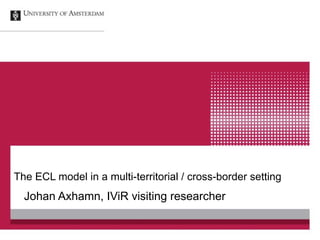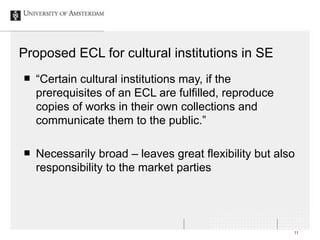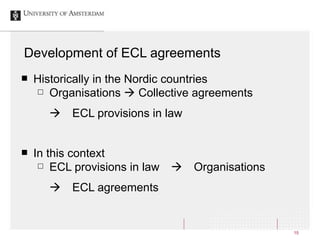The ECL model in a multi-territorial / cross-border settingJohan
- 1. The ECL model in a multi-territorial / cross-border setting Johan Axhamn, IViR visiting researcher
- 2. ŌĆ£TypicalŌĆØ characteristics of digitization and online dissemination of the collections of the national cultural institutions ┬ó’éó Many copyright protected items ┬ó’éó Many right holders, including outsiders ┬ó’éó Mass-use: Many items are to be digitised and disseminated online (in a relatively short period of time). ┬ó’éó Many works are orphan, i.e. it is difficult to find or locate the right holder ┬ó’éó Very high or infinite transaction costs and therefore suitable for an ECL solution at national level ┬Ż’éŻ Presupposes good structure and culture of CMOs Type the footer here 2
- 3. ECL? ┬ó’éó ECL provisions and agreements in the Nordic countries ┬Ż’éŻ The extension effect is supported by law ┬Ż’éŻ Legal safeguards for outsiders ┬ó’éó ŌĆØECLsŌĆØ not supported by legislation ┬Ż’éŻ Traditionally referred to as indemnity agreements 3
- 4. Cross-border solution Type the footer here 4
- 5. The cross-border (multi-territory) problem ┬ó’éó Copyright is territorial, i.e. permission to use (license) has to be cleared with right holders in every country (territory) where use occurs ┬ó’éó The current legal situation is that the act of making available to the public of a copyright protected work takes place in all the territories where it can be received. ┬Ż’éŻ i.e. a country of destination/access rather than country of transmission (i.e. the country in which the service originates) principle ┬ó’éó Traditionally, national CMOs have issued licenses only for their own territory ┬Ż’éŻ Multi-repertoire and mono-territory licenses Type the footer here 5
- 6. .. but there is demand and political pressure on making the collections of cultural institutions available all over Europe (through Europeana) ┬ó’éó i.e. demand for multi- territory licenses Type the footer here 6
- 7. Possible solutions to the multi-repertoire multi- territory problem ┬ó’éó Encourage the cultural institutions to clear the rights with CMOs in every country of destination ┬ó’éó Promote multi-territory licensing ┬ó’éó Introduce a country of transmission principle 7
- 8. Encourage the cultural institutions to clear the rights with CMOs in every country of destination ┬ó’éó ŌĆ£Do nothingŌĆØ ┬ó’éó Pro/con: The territoriality of copyright is kept intact within the EU ┬ó’éó Con: Very high transaction costs for cultural institutions to negotiate licenses with CMOs in each and every member state, even if ECL provisions are introduced at national level
- 9. Promote multi-territory licensing ┬ó’éó Encourage the CMOs to develop the current system of reciprocal agreements ┬Ż’éŻ A model similar to the ŌĆ£IFPI Simulcasting agreementŌĆØ ╦£’éś The traditional multi-repertoire mono-territory aspect of the reciprocal agreements is supplemented by a mandate enabling the national CMOs to license multi repertoires for multiple (i.e. also each others) territories. ╦£’éś The user does not have to obtain the license from his national CMO. ┬ó’éó Pro/con: Based on free negotiations between the CMOs. ┬ó’éó Pro/con: The territoriality of copyright is kept intact within the EU
- 10. Introduce a country of transmission principle ┬ó’éó Similar to the ŌĆ£country of uplinkŌĆØ principle in the Sat/Cab directive ┬Ż’éŻ The copyright-relevant act only occurs in the country where the library is residing ┬ó’éó The national cultural institution would only have to clear rights with CMOs in its country of residence ┬ó’éó Reasonably, the provision has to be limited to content that is only of national cultural importance (in line with the aims of Europeana) ┬Ż’éŻ Is ŌĆ£country of first publicationŌĆØ an adequate notion? ┬ó’éó Pro: Easy rights-clearance and legal certainty for libraries.
- 11. Proposed ECL for cultural institutions in SE ┬ó’éó ŌĆ£Certain cultural institutions may, if the prerequisites of an ECL are fulfilled, reproduce copies of works in their own collections and communicate them to the public.ŌĆØ ┬ó’éó Necessarily broad ŌĆō leaves great flexibility but also responsibility to the market parties 11
- 12. Commission staff working document (2007) ┬ó’éó ŌĆ£The extension of the country of origin principle raises a number of concerns, such as the difficulties of locating the relevant act of transmission in the digital environment, the risk of devaluation of copyright if a single tariff and license were to be applied to the whole Internal Market.ŌĆØ Type the footer here
- 13. Green paper ŌĆō copyright and related rights in the Information society (1995) ┬ó’éó ŌĆ£Here as elsewhere the basic principle should be that the applicable law is that of the Member State in which the service originates. But in the intellectual property sphere that principle can be applied only if there is a far- reaching harmonization of the relevant rights at the same time.ŌĆØ ┬ó’éó ŌĆ£A Community rule on the applicable law would seem to be indispensable. Such a rule could be along the lines of the mechanism in the Satellite and Cable Directive: the act of communication could be defined in a similar way, on the basis of transmission rather than reception.ŌĆØ Type the footer here
- 14. Conclusion ┬ó’éó Possible solution ┬Ż’éŻ Combine an ECL provision at national level with a principle of country of transmission ╦£’éś For cross-border dissemination of national cultural heritage ┬Ż’éŻ Introduce common EU principles on good 14
- 15. Development of ECL agreements ┬ó’éó Historically in the Nordic countries ┬Ż’éŻ Organisations ├Ā’āĀ Collective agreements ├Ā’āĀ ECL provisions in law ┬ó’éó In this context ┬Ż’éŻ ECL provisions in law ├Ā’āĀ Organisations ├Ā’āĀ ECL agreements 15















